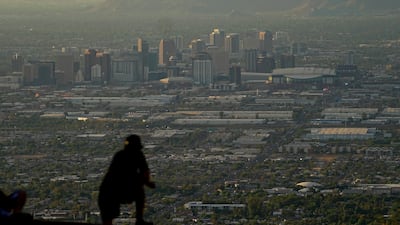The south-western US city of Phoenix has ended its 31-day streak of temperatures higher than 43°C thanks to monsoon rains.
The National Weather Service reported on Monday night that the Arizona state capital had reached a high of 42.2°C. But the respite will be short-lived.
“Although the streak of 110+F (43°C) days has ended, we have some bad news,” the weather agency said.
Temperatures above 43°C are expected to return as soon as Wednesday, with even hotter temperatures forecast for this weekend.
The NWS also reported that July was the hottest month on record for Phoenix with an average temperature of 39.2°C. The previous record of 37.2°C was set back in August 2020.
The American south-west has suffered under the heatwave that has swept through the country since last month. It has only intensified since, with scientists proclaiming this month to be the hottest the world has recorded.
In California on Monday, firefighters were battling so-called fire whirls, “spinning columns of fire” that form when turbulent winds combine with excessive heat, the NWS said.
Two fire whirls were reported at the north end of the York Fire, from which plumes of smoke drifted over the Las Vegas Strip. The fire was not under control as of Monday night.
Las Vegas is closing in on a temperature record of its own. The city's record average daily temperature for July currently stands at 35.5°C. The last two weeks have been the hottest 14-day stretch in the city's history, with an average temperature of 38.16°C.
Sizzling temperatures have also led to some places in the mid-west, north-east and mid-Atlantic regions recording their hottest days of the year.
The NWS prediction centre has forecast more than 100 million people this week may experience a “dangerous heat index reading” of 40.5°C or higher.
Portions of the Central and Southern Plains, Lower Mississippi Valley and areas along the Gulf Coast will all face dangerous heat. The combination of heat and humidity will also create lead to readings of more than 43.3°C in eastern Texas, Louisiana and southern Mississippi.
The NWS has warned the latest heat could bring record warm lows during the night and oppressive heat during the day.

